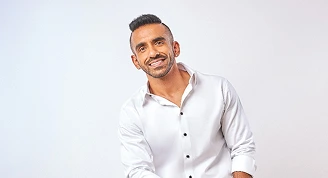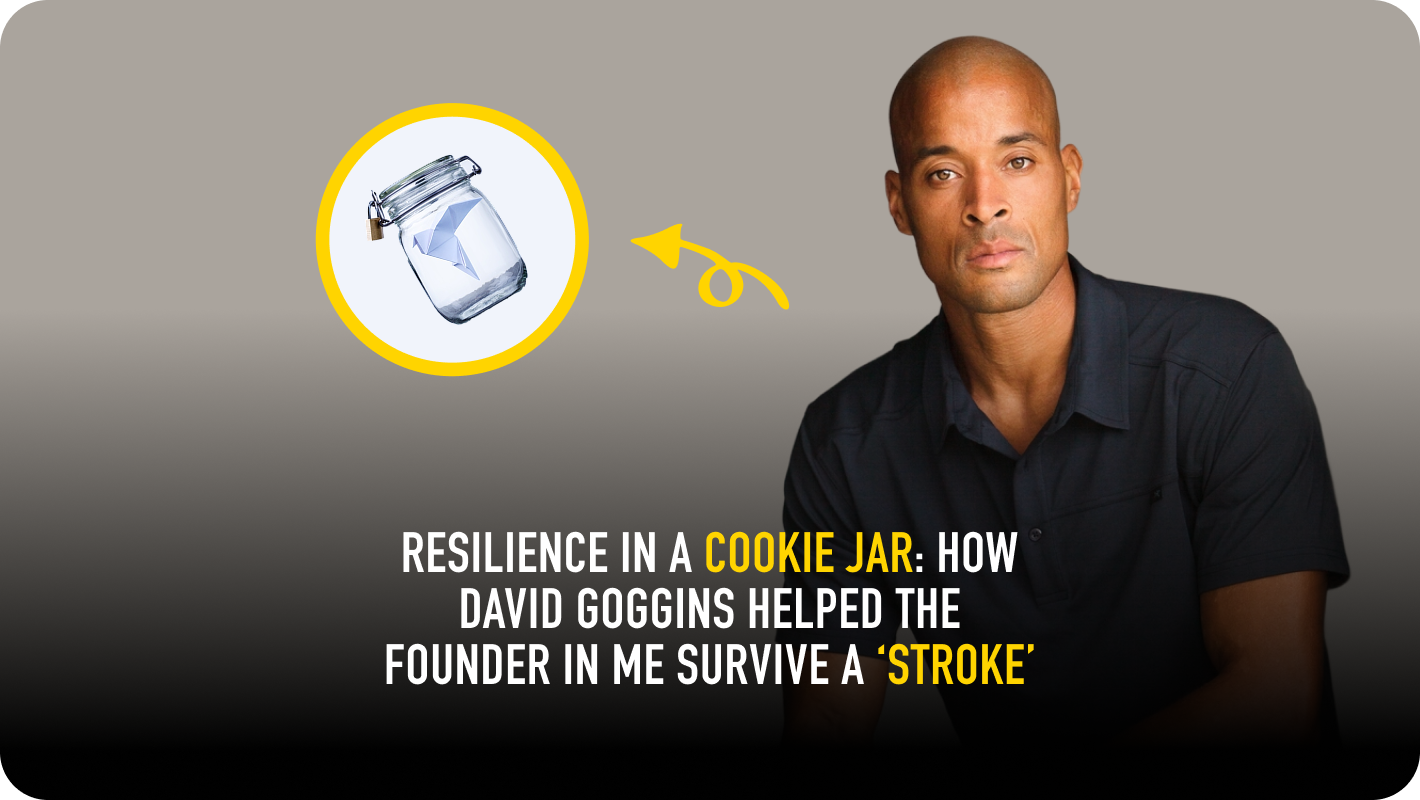
What’s a startup founder’s worst enemy? It’s resistance to believe in one's own potential. And here’s the patron saint of daredevils who can help founders overcome being enslaved by it.
How? While we all wish to be rewarded for the hardships we think we have endured, Goggins engineered his life to embrace suffering. He went through US Navy SEAL Hell Week three times. Not because he failed. Not because he had to. Because he chose to.
But why does his story matter for founders? Because every founder has to face their ‘stroke moment’, the crisis that strips away illusion and tests whether you actually have the resilience you think you do. What saved me during that do-or-die ‘golden hour’ wasn't strategy therapy. It was a single Goggins framework, the Cookie Jar, which he had effectively used to weaponise trauma into systematic mental conditioning. It was this framework that helped me rebuild my life when my body failed and my bank account hit zero. In fact, this very framework had already been mastered by Indian Yogis centuries ago, a discovery that led me to research the topic further.

The monster who mastered
‘controlled suffering’
David Goggins wasn't born extraordinary. He was born into hell. An abusive father who beat him and his mother. Poverty meant going hungry, and racism made him feel worthless, while learning disabilities convinced him he was stupid. By his twenties, he was 300 pounds, working as an exterminator, depressed and trapped.
The transformation began with a single moment of brutal honesty. Standing in front of his bathroom mirror, he confronted what he'd become. Instead of positive affirmations, he wrote his failures on sticky notes: ‘fat’, ‘lazy’, ‘liar’. This became his Accountability Mirror, a daily forced confrontation with reality that most people spend their lives avoiding.
But here's what makes his story remarkable: He didn't just lose weight or get fit. He systematically rebuilt his nervous system. Three attempts at Navy SEAL Hell Week. Ultramarathons that nearly killed him. Pull-up world records that shredded his hands to the bone.
Each brutal experience became data, not punishment. He was training his brain to function when everything hurt, when quitting seemed logical, when his mind screamed stop. Huberman Lab research later showed that his anterior mid-cingulate cortex, the brain's willpower centre, was literally larger than average. But it didn't start that way. It grew through systematic exposure to what he calls ‘controlled suffering’.

When my comfortable world exploded
I discovered Goggins while lying flat on a hospital bed after a stroke, staring at a near-empty bank account. This was a biological catastrophe paired with a financial collapse I had never imagined or prepared for. Despite years of struggle - selling shoes on the streets of Kathmandu as a child, surviving on bread and water in America, and sleeping on airport floors - I felt my core identity cracking for the first time. The belief that I could always figure things out suddenly seemed fragile.That's when the Cookie Jar technique saved me.
Goggins' insight: Systematically catalogue every brutal win you've already had. Every moment you thought you were done, but kept going. And when your mind screams, "This is impossible," you reach into that jar and pull out evidence that you've survived worse.
I reframed my life's scars, not as signs of hardship, but as proof of capacity. The airport floors, the bread-and-water weeks, every business challenge that felt impossible until it wasn't. All ammunition.
The stroke wasn't the end of my story. It was just the biggest cookie in my jar.
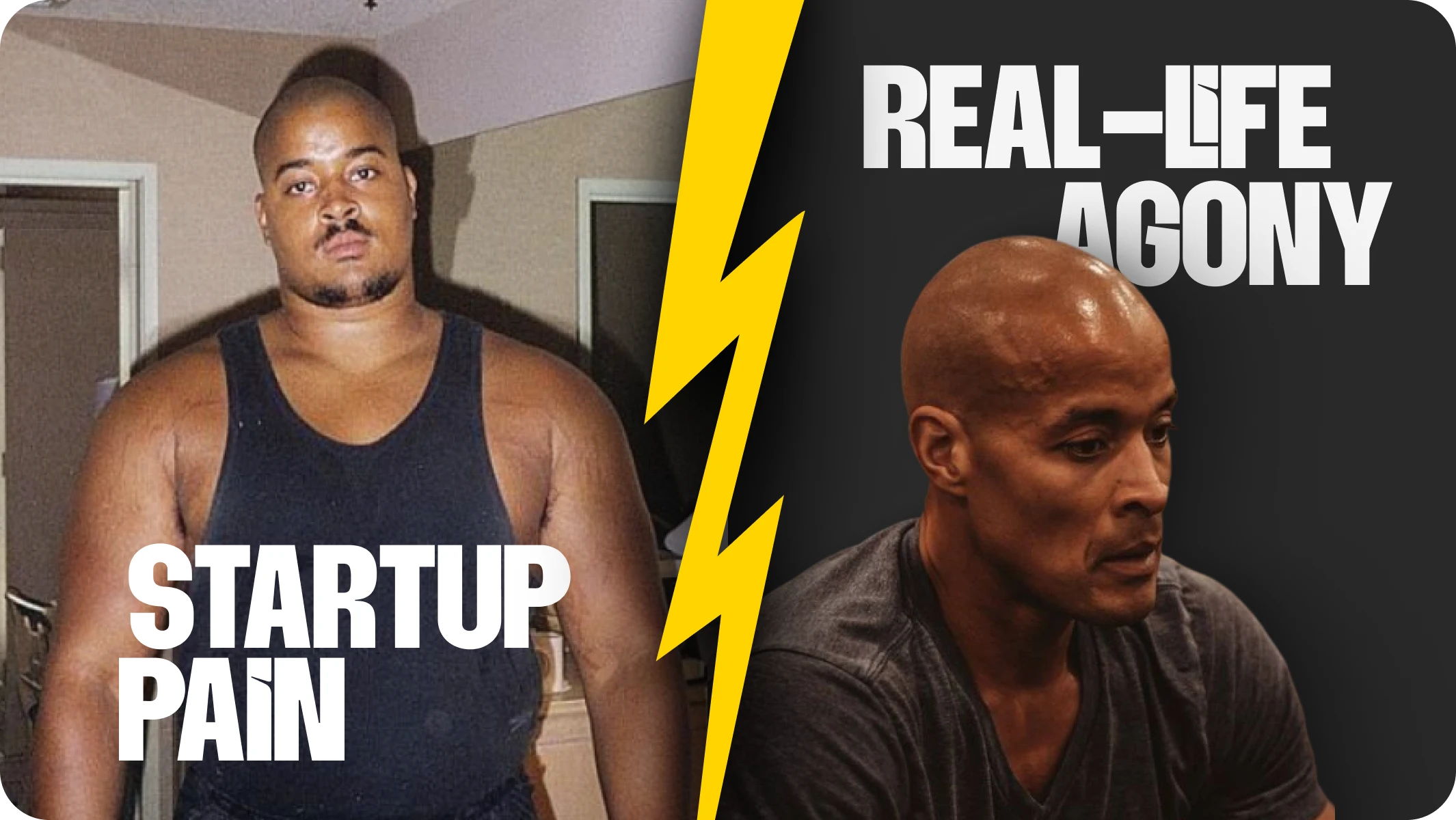
Startup pain vs real-life agony
For most startups, testing occurs in a climate-controlled environment with endless coffee and seamless WiFi connectivity, and we call it 80-hour workweeks. Goggins ran ultramarathons on broken legs and carried boats on his head while instructors tried to break his will. The uncomfortable truth is that most of us have never been tested. We've stress-tested our comfort zones, not our actual limits.
Goggins' 40% Rule states that when you feel completely done, you're only 40% spent. That's not a motivational quote, but neuroscience. Our brain creates artificial limits to keep us ‘safe’. Real resilience means learning to override that emergency brake.
Here's the practical difference: When a crisis hits, comfort-trained founders panic because they have no reference points for genuine adversity. They operate with fear and hope as reference points. Adversity-trained founders access a different database - systematic evidence of their ability to function when everything falls apart.
The mind's first assessment of your capacity is usually wrong. When you think you're finished, you're probably just getting started.

Ancient wisdom meets modern extremes
What Goggins discovered through brutal trial and error, yogic philosophy codified 5,000 years ago. The ancient Indian practice of ‘Tapas’, voluntary austerity and discipline, wasn't masochism. It was systematic training for the mind's tendency to panic and crave comfort.
My ‘Kumbhaka’ practice (breath retention) taught me the same lesson. When your lungs scream for air and panic floods your nervous system, you discover something profound. That the urge is just a sensation and the fear is just a thought. You don't have to obey either.
This is what Goggins found in his Accountability Mirror and what every founder discovers during dark moments. The mind's first reaction isn't truth but conditioning. When facing investor rejection, your mind says, "We're failing". When confronting technical problems, it whispers, "impossible". When staring at empty bank accounts, it screams, "finished".
But the yogic insight that saved my life was that these thoughts are weather, not reality. They arise, peak, and pass away if you don't feed them with reactive behaviour.
Stillness through fire, not despite it
Western culture misunderstands both yoga and resilience. We think stillness means avoiding turbulence, that peace requires perfect conditions. But true equanimity emerges only through systematic exposure to chaos.
You don't build unshakeable calm in meditation retreats. You build it by remaining centred while everything falls apart. This is why Goggins seeks suffering and yogis embrace discomfort. They understand that freedom lives on the other side of your resistance to what is. As Goggins says, "Suffering is the true test of life".

Building your Cookie Jar system
Here's the framework I developed during recovery:
Step 1: Inventory your wins.
Write down every time you thought you couldn't continue and did. Not the victories that felt good, but the moments when you were certain you were finished but somehow found a way through. Each becomes psychological ammunition.
Step 2: Add new cookies daily.
One chosen discomfort every morning, regardless of how you feel. Cold showers when you want warmth. Difficult conversations you've been avoiding. Giving up comfort foods that your mind craves. These aren't punishments. They're systematic conditioning. Each small victory strengthens the neural pathways that activate during a real crisis. When everything collapsed, I had months of evidence that I could choose difficulty over ease.
Step 3: Deploy during a crisis.
When panic hits, reach into the jar. Replace "I've never faced anything like this" with specific memories like, "I survived sleeping on airport floors. I figured out solutions when everything seemed hopeless. This is just another test of the same capabilities".
As Goggins puts it: "We live in an external world. Everything, you have to see it, touch it. The internal world is more powerful than the external world. The things you talk to yourself about are the most powerful things you will ever hear".
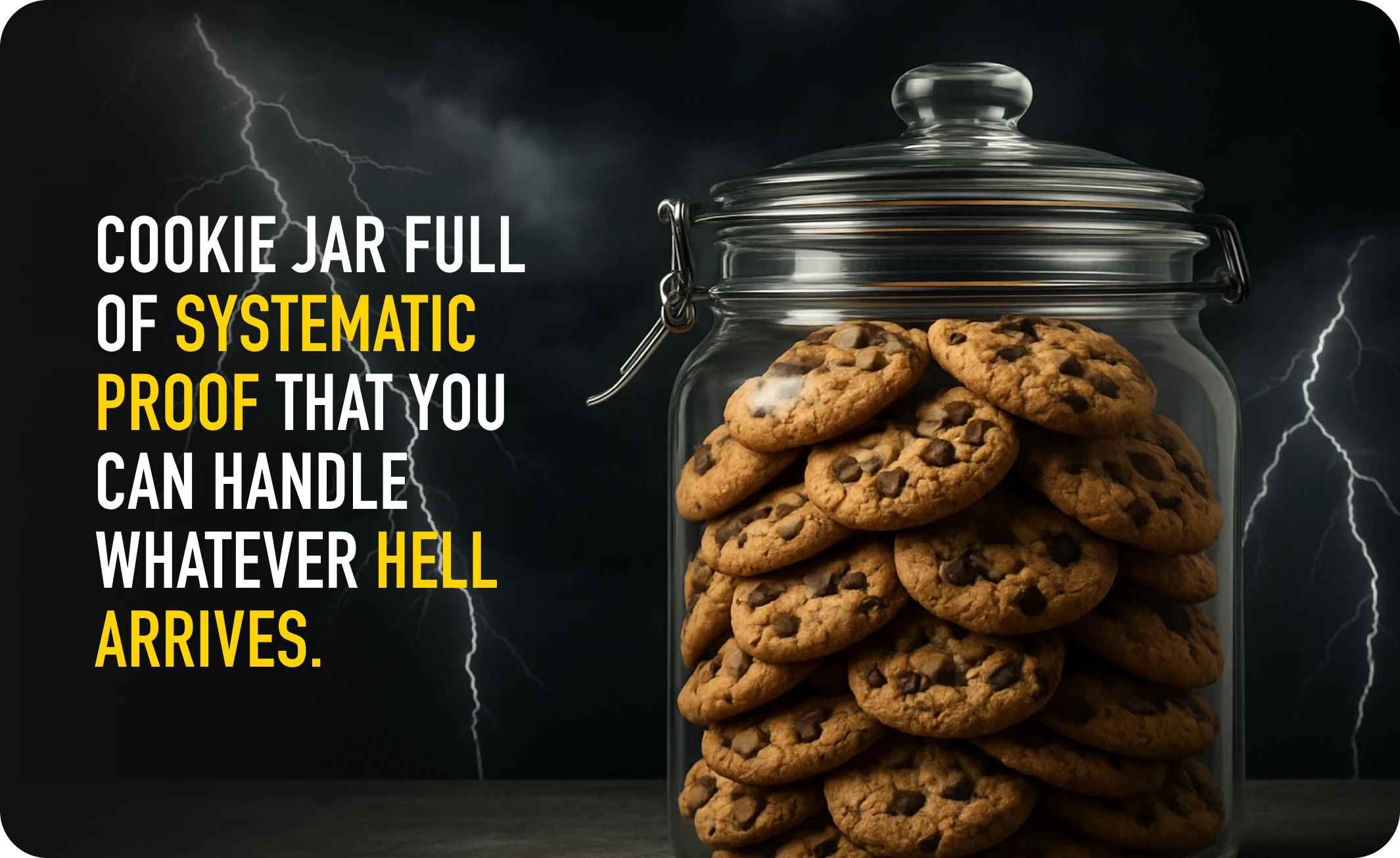
The choice between systematic proof & optimism
Your storm is coming. The only choice is whether you face it with panic or with a Cookie Jar full of systematic proof that you can handle whatever hell arrives. Here's what's at stake. While others optimise for comfort, you can build antifragile psychology. When a crisis hits, you'll have weapons while they have wishes. You'll access years of evidence that you can function under pressure while they're discovering they're not who they thought they were.
Start building your Cookie Jar now:
Choose one small daily discomfort starting today. Not because you enjoy suffering, but because you understand what Goggins and ancient yogis knew. Your capacity to remain present and responsive regardless of conditions is the only asset that truly belongs to you.
For those beginning their journey:
- If you avoid confrontation: Have one difficult conversation daily. Call that demanding client. Address team performance issues. Practice staying calm while others get emotional.
- If you procrastinate on hard tasks: Do your most dreaded work first thing each morning. The tax filing you've delayed. The strategic planning you keep pushing off. Build proof you can tackle what you resist.
- If you're physically soft: Cold showers for 30 seconds minimum. Take the stairs instead of the elevators. Walk when you want to drive. Show your nervous system that discomfort is survivable.
- If you avoid financial reality: Review your actual numbers weekly, not just the pretty dashboards. Cash flow, burn rate, and real customer acquisition costs. Face the brutal facts.
The point isn't these specific actions - it's the principle. Choose small discomforts that prove to your nervous system you can override your mind's first impulse. Start building evidence that you can function when things aren't easy. Your past struggles weren't accidents. They were training for everything coming next. And your willingness to choose discomfort today determines whether you'll be ready when tomorrow's hell arrives.
While our sympathetic nervous system controls the body’s “fight or flight” response, the parasympathetic nervous system helps to control the body’s response during times of rest. The idea is to regulate our nervous system for mental stillness and also to realise that what we perceive as fear isn't necessarily fear.
Goggins achieved this by declaring: "You are in danger of living a life so comfortable and soft that you will die without ever realising your true potential." You need not be too hard on yourself; just stay still and build your Cookie Jar with some help from ancient wisdom.
The Indian traditional yogic practices have the potential to balance the sympathetic and parasympathetic systems to help us transition between the two systems efficiently, effectively, and quickly. The result is a calm mind that helps us decide with clarity and not reactivity.
Your future self will thank you when the Cookie Jar overflows with a lifetime of success stories.
If you want to dive deeper into Goggins' complete system, read "Can't Hurt Me" - it's the manual for mental conditioning that this article only scratches the surface of. His second book, "Never Finished," goes even further into the psychology of continuous improvement.
What’s a startup founder’s worst enemy? It’s resistance to believe in one's own potential. And here’s the patron saint of daredevils who can help founders overcome being enslaved by it.
How? While we all wish to be rewarded for the hardships we think we have endured, Goggins engineered his life to embrace suffering. He went through US Navy SEAL Hell Week three times. Not because he failed. Not because he had to. Because he chose to.
But why does his story matter for founders? Because every founder has to face their ‘stroke moment’, the crisis that strips away illusion and tests whether you actually have the resilience you think you do. What saved me during that do-or-die ‘golden hour’ wasn't strategy therapy. It was a single Goggins framework, the Cookie Jar, which he had effectively used to weaponise trauma into systematic mental conditioning. It was this framework that helped me rebuild my life when my body failed and my bank account hit zero. In fact, this very framework had already been mastered by Indian Yogis centuries ago, a discovery that led me to research the topic further.

The monster who mastered
‘controlled suffering’
David Goggins wasn't born extraordinary. He was born into hell. An abusive father who beat him and his mother. Poverty meant going hungry, and racism made him feel worthless, while learning disabilities convinced him he was stupid. By his twenties, he was 300 pounds, working as an exterminator, depressed and trapped.
The transformation began with a single moment of brutal honesty. Standing in front of his bathroom mirror, he confronted what he'd become. Instead of positive affirmations, he wrote his failures on sticky notes: ‘fat’, ‘lazy’, ‘liar’. This became his Accountability Mirror, a daily forced confrontation with reality that most people spend their lives avoiding.
But here's what makes his story remarkable: He didn't just lose weight or get fit. He systematically rebuilt his nervous system. Three attempts at Navy SEAL Hell Week. Ultramarathons that nearly killed him. Pull-up world records that shredded his hands to the bone.
Each brutal experience became data, not punishment. He was training his brain to function when everything hurt, when quitting seemed logical, when his mind screamed stop. Huberman Lab research later showed that his anterior mid-cingulate cortex, the brain's willpower centre, was literally larger than average. But it didn't start that way. It grew through systematic exposure to what he calls ‘controlled suffering’.

When my comfortable world exploded
I discovered Goggins while lying flat on a hospital bed after a stroke, staring at a near-empty bank account. This was a biological catastrophe paired with a financial collapse I had never imagined or prepared for. Despite years of struggle - selling shoes on the streets of Kathmandu as a child, surviving on bread and water in America, and sleeping on airport floors - I felt my core identity cracking for the first time. The belief that I could always figure things out suddenly seemed fragile.That's when the Cookie Jar technique saved me.
Goggins' insight: Systematically catalogue every brutal win you've already had. Every moment you thought you were done, but kept going. And when your mind screams, "This is impossible," you reach into that jar and pull out evidence that you've survived worse.
I reframed my life's scars, not as signs of hardship, but as proof of capacity. The airport floors, the bread-and-water weeks, every business challenge that felt impossible until it wasn't. All ammunition.
The stroke wasn't the end of my story. It was just the biggest cookie in my jar.

Startup pain vs real-life agony
For most startups, testing occurs in a climate-controlled environment with endless coffee and seamless WiFi connectivity, and we call it 80-hour workweeks. Goggins ran ultramarathons on broken legs and carried boats on his head while instructors tried to break his will. The uncomfortable truth is that most of us have never been tested. We've stress-tested our comfort zones, not our actual limits.
Goggins' 40% Rule states that when you feel completely done, you're only 40% spent. That's not a motivational quote, but neuroscience. Our brain creates artificial limits to keep us ‘safe’. Real resilience means learning to override that emergency brake.
Here's the practical difference: When a crisis hits, comfort-trained founders panic because they have no reference points for genuine adversity. They operate with fear and hope as reference points. Adversity-trained founders access a different database - systematic evidence of their ability to function when everything falls apart.
The mind's first assessment of your capacity is usually wrong. When you think you're finished, you're probably just getting started.

Ancient wisdom meets modern extremes
What Goggins discovered through brutal trial and error, yogic philosophy codified 5,000 years ago. The ancient Indian practice of ‘Tapas’, voluntary austerity and discipline, wasn't masochism. It was systematic training for the mind's tendency to panic and crave comfort.
My ‘Kumbhaka’ practice (breath retention) taught me the same lesson. When your lungs scream for air and panic floods your nervous system, you discover something profound. That the urge is just a sensation and the fear is just a thought. You don't have to obey either.
This is what Goggins found in his Accountability Mirror and what every founder discovers during dark moments. The mind's first reaction isn't truth but conditioning. When facing investor rejection, your mind says, "We're failing". When confronting technical problems, it whispers, "impossible". When staring at empty bank accounts, it screams, "finished".
But the yogic insight that saved my life was that these thoughts are weather, not reality. They arise, peak, and pass away if you don't feed them with reactive behaviour.
Stillness through fire, not despite it
Western culture misunderstands both yoga and resilience. We think stillness means avoiding turbulence, that peace requires perfect conditions. But true equanimity emerges only through systematic exposure to chaos.
You don't build unshakeable calm in meditation retreats. You build it by remaining centred while everything falls apart. This is why Goggins seeks suffering and yogis embrace discomfort. They understand that freedom lives on the other side of your resistance to what is. As Goggins says, "Suffering is the true test of life".

Building your Cookie Jar system
Here's the framework I developed during recovery:
Step 1: Inventory your wins.
Write down every time you thought you couldn't continue and did. Not the victories that felt good, but the moments when you were certain you were finished but somehow found a way through. Each becomes psychological ammunition.
Step 2: Add new cookies daily.
One chosen discomfort every morning, regardless of how you feel. Cold showers when you want warmth. Difficult conversations you've been avoiding. Giving up comfort foods that your mind craves. These aren't punishments. They're systematic conditioning. Each small victory strengthens the neural pathways that activate during a real crisis. When everything collapsed, I had months of evidence that I could choose difficulty over ease.
Step 3: Deploy during a crisis.
When panic hits, reach into the jar. Replace "I've never faced anything like this" with specific memories like, "I survived sleeping on airport floors. I figured out solutions when everything seemed hopeless. This is just another test of the same capabilities".
As Goggins puts it: "We live in an external world. Everything, you have to see it, touch it. The internal world is more powerful than the external world. The things you talk to yourself about are the most powerful things you will ever hear".

The choice between systematic proof & optimism
Your storm is coming. The only choice is whether you face it with panic or with a Cookie Jar full of systematic proof that you can handle whatever hell arrives. Here's what's at stake. While others optimise for comfort, you can build antifragile psychology. When a crisis hits, you'll have weapons while they have wishes. You'll access years of evidence that you can function under pressure while they're discovering they're not who they thought they were.
Start building your Cookie Jar now:
Choose one small daily discomfort starting today. Not because you enjoy suffering, but because you understand what Goggins and ancient yogis knew. Your capacity to remain present and responsive regardless of conditions is the only asset that truly belongs to you.
For those beginning their journey:
- If you avoid confrontation: Have one difficult conversation daily. Call that demanding client. Address team performance issues. Practice staying calm while others get emotional.
- If you procrastinate on hard tasks: Do your most dreaded work first thing each morning. The tax filing you've delayed. The strategic planning you keep pushing off. Build proof you can tackle what you resist.
- If you're physically soft: Cold showers for 30 seconds minimum. Take the stairs instead of the elevators. Walk when you want to drive. Show your nervous system that discomfort is survivable.
- If you avoid financial reality: Review your actual numbers weekly, not just the pretty dashboards. Cash flow, burn rate, and real customer acquisition costs. Face the brutal facts.
The point isn't these specific actions - it's the principle. Choose small discomforts that prove to your nervous system you can override your mind's first impulse. Start building evidence that you can function when things aren't easy. Your past struggles weren't accidents. They were training for everything coming next. And your willingness to choose discomfort today determines whether you'll be ready when tomorrow's hell arrives.
While our sympathetic nervous system controls the body’s “fight or flight” response, the parasympathetic nervous system helps to control the body’s response during times of rest. The idea is to regulate our nervous system for mental stillness and also to realise that what we perceive as fear isn't necessarily fear.
Goggins achieved this by declaring: "You are in danger of living a life so comfortable and soft that you will die without ever realising your true potential." You need not be too hard on yourself; just stay still and build your Cookie Jar with some help from ancient wisdom.
The Indian traditional yogic practices have the potential to balance the sympathetic and parasympathetic systems to help us transition between the two systems efficiently, effectively, and quickly. The result is a calm mind that helps us decide with clarity and not reactivity.
Your future self will thank you when the Cookie Jar overflows with a lifetime of success stories.
If you want to dive deeper into Goggins' complete system, read "Can't Hurt Me" - it's the manual for mental conditioning that this article only scratches the surface of. His second book, "Never Finished," goes even further into the psychology of continuous improvement.

What’s a startup founder’s worst enemy? It’s resistance to believe in one's own potential. And here’s the patron saint of daredevils who can help founders overcome being enslaved by it.
How? While we all wish to be rewarded for the hardships we think we have endured, Goggins engineered his life to embrace suffering. He went through US Navy SEAL Hell Week three times. Not because he failed. Not because he had to. Because he chose to.
But why does his story matter for founders? Because every founder has to face their ‘stroke moment’, the crisis that strips away illusion and tests whether you actually have the resilience you think you do. What saved me during that do-or-die ‘golden hour’ wasn't strategy therapy. It was a single Goggins framework, the Cookie Jar, which he had effectively used to weaponise trauma into systematic mental conditioning. It was this framework that helped me rebuild my life when my body failed and my bank account hit zero. In fact, this very framework had already been mastered by Indian Yogis centuries ago, a discovery that led me to research the topic further.

The monster who mastered
‘controlled suffering’
David Goggins wasn't born extraordinary. He was born into hell. An abusive father who beat him and his mother. Poverty meant going hungry, and racism made him feel worthless, while learning disabilities convinced him he was stupid. By his twenties, he was 300 pounds, working as an exterminator, depressed and trapped.
The transformation began with a single moment of brutal honesty. Standing in front of his bathroom mirror, he confronted what he'd become. Instead of positive affirmations, he wrote his failures on sticky notes: ‘fat’, ‘lazy’, ‘liar’. This became his Accountability Mirror, a daily forced confrontation with reality that most people spend their lives avoiding.
But here's what makes his story remarkable: He didn't just lose weight or get fit. He systematically rebuilt his nervous system. Three attempts at Navy SEAL Hell Week. Ultramarathons that nearly killed him. Pull-up world records that shredded his hands to the bone.
Each brutal experience became data, not punishment. He was training his brain to function when everything hurt, when quitting seemed logical, when his mind screamed stop. Huberman Lab research later showed that his anterior mid-cingulate cortex, the brain's willpower centre, was literally larger than average. But it didn't start that way. It grew through systematic exposure to what he calls ‘controlled suffering’.

When my comfortable world exploded
I discovered Goggins while lying flat on a hospital bed after a stroke, staring at a near-empty bank account. This was a biological catastrophe paired with a financial collapse I had never imagined or prepared for. Despite years of struggle - selling shoes on the streets of Kathmandu as a child, surviving on bread and water in America, and sleeping on airport floors - I felt my core identity cracking for the first time. The belief that I could always figure things out suddenly seemed fragile.That's when the Cookie Jar technique saved me.
Goggins' insight: Systematically catalogue every brutal win you've already had. Every moment you thought you were done, but kept going. And when your mind screams, "This is impossible," you reach into that jar and pull out evidence that you've survived worse.
I reframed my life's scars, not as signs of hardship, but as proof of capacity. The airport floors, the bread-and-water weeks, every business challenge that felt impossible until it wasn't. All ammunition.
The stroke wasn't the end of my story. It was just the biggest cookie in my jar.

Startup pain vs real-life agony
For most startups, testing occurs in a climate-controlled environment with endless coffee and seamless WiFi connectivity, and we call it 80-hour workweeks. Goggins ran ultramarathons on broken legs and carried boats on his head while instructors tried to break his will. The uncomfortable truth is that most of us have never been tested. We've stress-tested our comfort zones, not our actual limits.
Goggins' 40% Rule states that when you feel completely done, you're only 40% spent. That's not a motivational quote, but neuroscience. Our brain creates artificial limits to keep us ‘safe’. Real resilience means learning to override that emergency brake.
Here's the practical difference: When a crisis hits, comfort-trained founders panic because they have no reference points for genuine adversity. They operate with fear and hope as reference points. Adversity-trained founders access a different database - systematic evidence of their ability to function when everything falls apart.
The mind's first assessment of your capacity is usually wrong. When you think you're finished, you're probably just getting started.

Ancient wisdom meets modern extremes
What Goggins discovered through brutal trial and error, yogic philosophy codified 5,000 years ago. The ancient Indian practice of ‘Tapas’, voluntary austerity and discipline, wasn't masochism. It was systematic training for the mind's tendency to panic and crave comfort.
My ‘Kumbhaka’ practice (breath retention) taught me the same lesson. When your lungs scream for air and panic floods your nervous system, you discover something profound. That the urge is just a sensation and the fear is just a thought. You don't have to obey either.
This is what Goggins found in his Accountability Mirror and what every founder discovers during dark moments. The mind's first reaction isn't truth but conditioning. When facing investor rejection, your mind says, "We're failing". When confronting technical problems, it whispers, "impossible". When staring at empty bank accounts, it screams, "finished".
But the yogic insight that saved my life was that these thoughts are weather, not reality. They arise, peak, and pass away if you don't feed them with reactive behaviour.
Stillness through fire, not despite it
Western culture misunderstands both yoga and resilience. We think stillness means avoiding turbulence, that peace requires perfect conditions. But true equanimity emerges only through systematic exposure to chaos.
You don't build unshakeable calm in meditation retreats. You build it by remaining centred while everything falls apart. This is why Goggins seeks suffering and yogis embrace discomfort. They understand that freedom lives on the other side of your resistance to what is. As Goggins says, "Suffering is the true test of life".

Building your Cookie Jar system
Here's the framework I developed during recovery:
Step 1: Inventory your wins.
Write down every time you thought you couldn't continue and did. Not the victories that felt good, but the moments when you were certain you were finished but somehow found a way through. Each becomes psychological ammunition.
Step 2: Add new cookies daily.
One chosen discomfort every morning, regardless of how you feel. Cold showers when you want warmth. Difficult conversations you've been avoiding. Giving up comfort foods that your mind craves. These aren't punishments. They're systematic conditioning. Each small victory strengthens the neural pathways that activate during a real crisis. When everything collapsed, I had months of evidence that I could choose difficulty over ease.
Step 3: Deploy during a crisis.
When panic hits, reach into the jar. Replace "I've never faced anything like this" with specific memories like, "I survived sleeping on airport floors. I figured out solutions when everything seemed hopeless. This is just another test of the same capabilities".
As Goggins puts it: "We live in an external world. Everything, you have to see it, touch it. The internal world is more powerful than the external world. The things you talk to yourself about are the most powerful things you will ever hear".

The choice between systematic proof & optimism
Your storm is coming. The only choice is whether you face it with panic or with a Cookie Jar full of systematic proof that you can handle whatever hell arrives. Here's what's at stake. While others optimise for comfort, you can build antifragile psychology. When a crisis hits, you'll have weapons while they have wishes. You'll access years of evidence that you can function under pressure while they're discovering they're not who they thought they were.
Start building your Cookie Jar now:
Choose one small daily discomfort starting today. Not because you enjoy suffering, but because you understand what Goggins and ancient yogis knew. Your capacity to remain present and responsive regardless of conditions is the only asset that truly belongs to you.
For those beginning their journey:
- If you avoid confrontation: Have one difficult conversation daily. Call that demanding client. Address team performance issues. Practice staying calm while others get emotional.
- If you procrastinate on hard tasks: Do your most dreaded work first thing each morning. The tax filing you've delayed. The strategic planning you keep pushing off. Build proof you can tackle what you resist.
- If you're physically soft: Cold showers for 30 seconds minimum. Take the stairs instead of the elevators. Walk when you want to drive. Show your nervous system that discomfort is survivable.
- If you avoid financial reality: Review your actual numbers weekly, not just the pretty dashboards. Cash flow, burn rate, and real customer acquisition costs. Face the brutal facts.
The point isn't these specific actions - it's the principle. Choose small discomforts that prove to your nervous system you can override your mind's first impulse. Start building evidence that you can function when things aren't easy. Your past struggles weren't accidents. They were training for everything coming next. And your willingness to choose discomfort today determines whether you'll be ready when tomorrow's hell arrives.
While our sympathetic nervous system controls the body’s “fight or flight” response, the parasympathetic nervous system helps to control the body’s response during times of rest. The idea is to regulate our nervous system for mental stillness and also to realise that what we perceive as fear isn't necessarily fear.
Goggins achieved this by declaring: "You are in danger of living a life so comfortable and soft that you will die without ever realising your true potential." You need not be too hard on yourself; just stay still and build your Cookie Jar with some help from ancient wisdom.
The Indian traditional yogic practices have the potential to balance the sympathetic and parasympathetic systems to help us transition between the two systems efficiently, effectively, and quickly. The result is a calm mind that helps us decide with clarity and not reactivity.
Your future self will thank you when the Cookie Jar overflows with a lifetime of success stories.
If you want to dive deeper into Goggins' complete system, read "Can't Hurt Me" - it's the manual for mental conditioning that this article only scratches the surface of. His second book, "Never Finished," goes even further into the psychology of continuous improvement.

Resonating with this philosophy?
Join the smartest founders mastering the inner game to face the unknown. Read by YC & Sequoia.



To be continued…
A small favor...
I don't run ads. If this brought clarity, the biggest favor you can do is subscribe below.


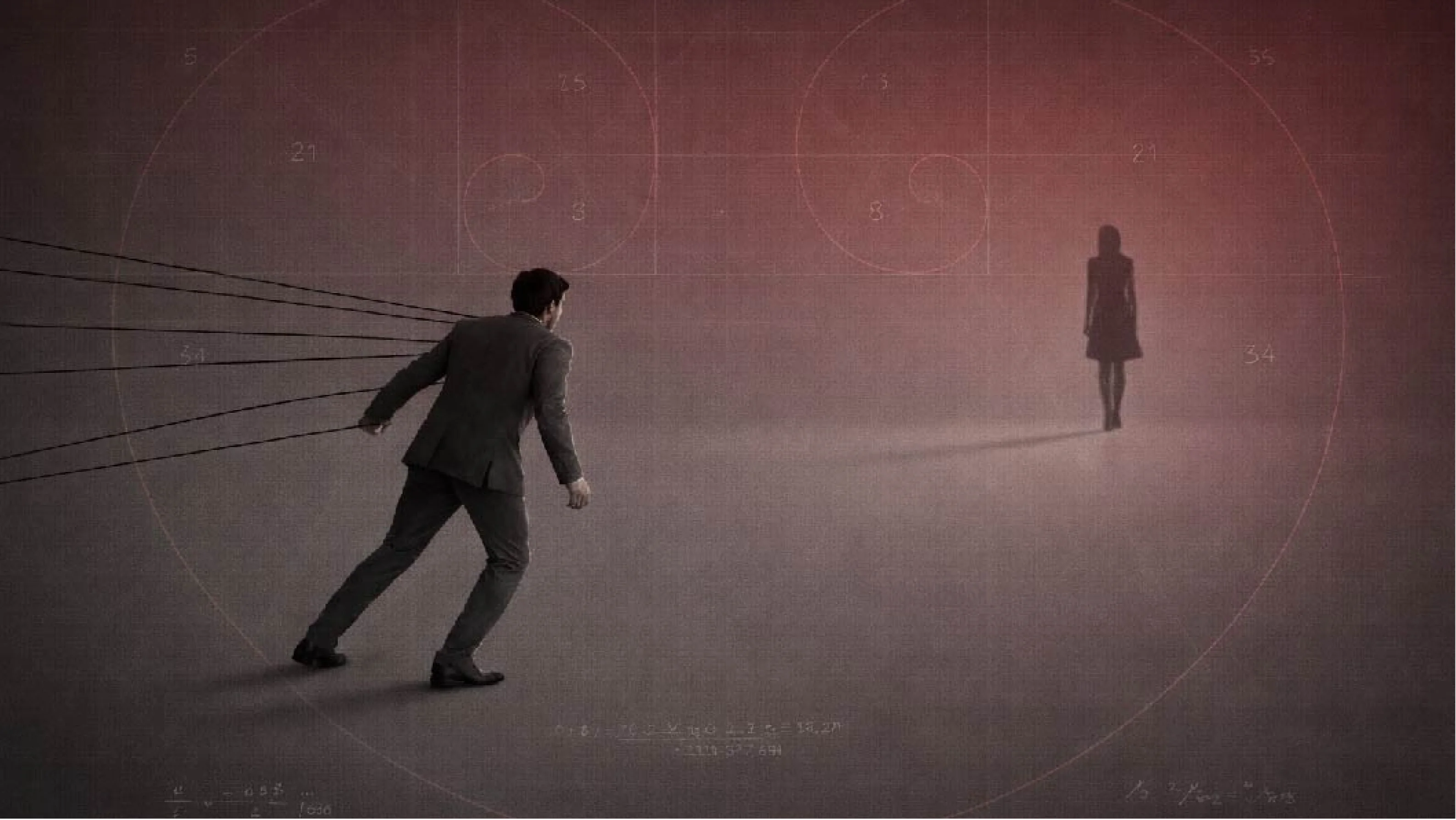
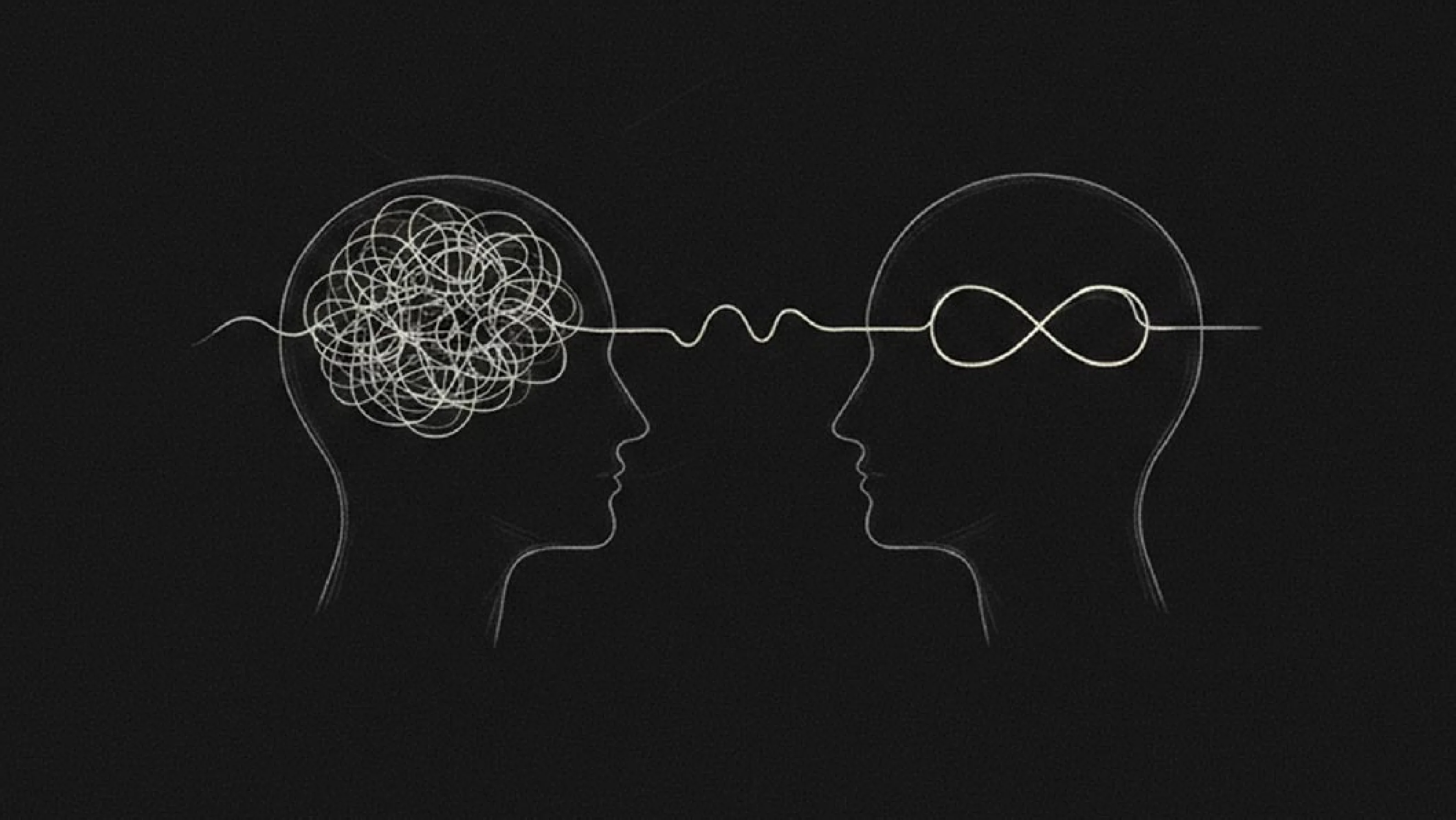
.svg)

.svg)
